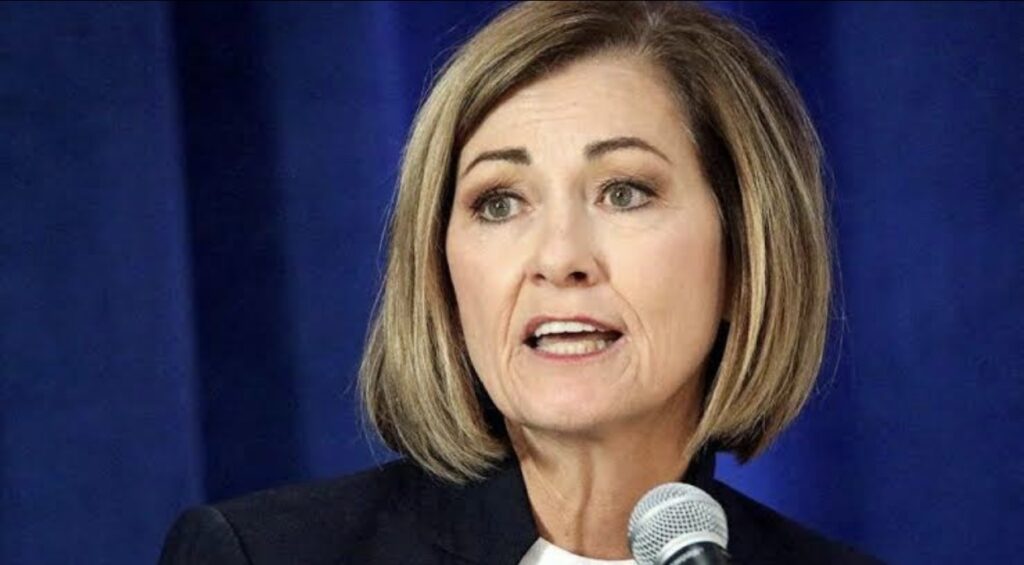Iowa Republican Governor Kim Reynolds on Friday enacted a law banning abortion at six weeks, initiating a fresh legal dispute over the future of reproductive rights in the pivotal early presidential state and intensifying the prominence of this divisive issue in the campaign. Accompanied by a group of Republican state legislators and anti-abortion leaders, Reynolds signed the legislation during a special on-stage event at the Family Leadership Summit, a prominent political gathering organized by an evangelical Christian group.
During the signing ceremony, Reynolds stated, “Every life is valuable and deserving of protection under our laws,” emphasizing that the law signifies an unwavering commitment to safeguarding the most vulnerable among us.
The law took effect immediately upon Reynolds’ signature, but its duration may be short-lived. Meanwhile, at the Polk County District Court in a separate legal proceeding, the judge presiding over a challenge filed by reproductive rights organizations seeking a temporary injunction indicated that a ruling would be issued next week.
During the hearing, Polk County District Court Judge Joseph Seidlin remarked, “This request demands my thorough and careful consideration.” A potential ruling could be announced as early as Monday.
If the request for an emergency injunction is granted, the implementation of the six-week ban would be halted until the legal challenge is resolved within the court system.
Planned Parenthood of the Heartland, the American Civil Liberties Union of Iowa, and the Emma Goldman Clinic, a women’s healthcare facility in Iowa City, filed the legal challenge in state court on Wednesday, arguing that the new ban violates the Iowa state constitution. Representatives of these organizations anticipate the case will eventually reach the state Supreme Court.
Despite facing legal opposition, Reynolds, along with several Republican presidential candidates, celebrated the signing of the law and expressed confidence in its ultimate success.
Reynolds stated, “Our work is not finished. As we gather here today, the abortion industry is attempting to prevent this law from taking effect and once again defy the will of the people.”
The legislation includes exceptions for instances involving the life of the mother, miscarriages, and fetal abnormalities determined by a physician to be “incompatible with life.”
Furthermore, the bill provides exceptions for pregnancies resulting from rape and incest. However, for these exceptions to apply, the rape must have been reported to law enforcement or a “public or private health agency” (including a family doctor) within 45 days, while the incest must have been reported within 140 days to any of the aforementioned officials or entities.
Advocates for reproductive rights argue that a six-week ban effectively amounts to a complete ban, as many women are not even aware of their pregnancy during that early stage.
Reproductive rights groups warned that if the law were immediately enforced, it would create chaos for abortion clinics and patients in the state. Planned Parenthood officials stated that clinics remained open until 10 p.m. on Thursday, providing care in anticipation of the law’s implementation on Friday.
Previously, abortion was legally permissible in Iowa until the 20th week of pregnancy.
Reynolds’ choice of venue for the signing further solidifies the significant role that the contentious issue of abortion rights will play in presidential politics, both within this crucial early-voting state and across the United States.
Notable attendees at Friday’s summit, moderated by conservative commentator Tucker Carlson, included Florida Governor Ron DeSantis, former Vice President Mike Pence, former South Carolina Governor Nikki Haley, South Carolina Senator Tim Scott, and businessman Vivek Ramaswamy. Many of them praised Reynolds and her bill at various points during the conference.
Following the signing, Haley commended Reynolds, stating, “Governor Kim Reynolds has achieved remarkable success.”
During a morning session before the signing, Pence remarked, “We are witnessing a historic day in Iowa,” commending Reynolds for her commitment to enacting “historic protections for the unborn.”
Former President Donald Trump, who has been less inclined to embrace strict abortion bans during his campaign compared to some of his rivals, did not attend the event.
While support for more stringent abortion restrictions remains popular among conservative evangelical Christians, a significant voting bloc in Iowa’s Republican caucuses, polling data in both Iowa and nationwide indicates that a majority of voters support abortion rights.
Additionally, although supporting a six-week ban may benefit a candidate in Iowa, it may have a different reception in New Hampshire, the subsequent primary contest in 2024.
The state’s Republican electorate, which leans more toward libertarianism, tends to adopt a more open stance on this issue. For instance, Governor Chris Sununu is among the few GOP governors who support abortion rights.
These challenges ahead underscore the difficulties that Republicans, more broadly, have faced in addressing voters regarding abortion rights since the Supreme Court’s Dobbs ruling overturned Roe v. Wade. In the midterm elections, Democrats capitalized on the abortion issue, contributing to their success.
In response to a split decision issued by the state Supreme Court earlier this month, allowing a previously enacted six-week abortion ban from 2018 to remain permanently blocked, Reynolds called for a special legislative session exclusively dedicated to enacting “pro-life legislation.”
The Iowa Legislature, under Republican control, swiftly passed the new six-week ban in just 15 hours on Tuesday.
While the new law faces similar legal challenges as its 2018 predecessor, the outcome this time may differ with a full state Supreme Court issuing a decision.
The court’s previous split ruling on the 2018 law was a narrowly tailored decision primarily based on procedural grounds, leaving open the possibility that a full seven-member court may reach a legal consensus on the new ban. One of the court’s seven justices, Dana Oxley, a Reynolds appointee, recused herself due to her former law firm’s representation of an abortion clinic involved in the original case.



